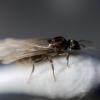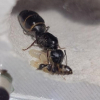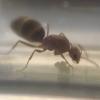- Formiculture.com
- Forums
- Gallery
- Members
- Member Map
- Chat

Nectar
Started By
JenC
, Feb 20 2019 5:22 PM
nectar ant diet how to make question hummingbird nectar
35 replies to this topic
#1
 Offline
-
Posted February 20 2019 - 5:22 PM
Offline
-
Posted February 20 2019 - 5:22 PM
How do you make hummingbird nectar? Also, I want to combine it with honey water. I heard that someone made a formula for it somewhere in formiculture but I couldn’t find it.
Thanks in Advance.
Thanks in Advance.
I love Camponotus!
Old Shop: https://www.formicul...-stallbay-area/
Current Shop: https://www.formicul...17962-ant-dump/
#2
 Offline
-
Posted February 20 2019 - 5:33 PM
Offline
-
Posted February 20 2019 - 5:33 PM
Some are pre-mixed, and others are concentrated liquids or powders to be mixed with water.
If you ever use honey—which I don't advise you do—never mix it with water.
Edited by drtrmiller, February 20 2019 - 5:34 PM.
byFormica® is the manufacturer of the iconic nectar feeders and Sunburst Ant Nectar.
byFormica ant products always deliver consistent performance, convenience,
and reliability, making them among the most beloved ant foods and kit enjoyed by
ant keeping enthusiasts worldwide. For more information, visit www.byFormica.com.
#3
 Offline
-
Posted February 20 2019 - 5:49 PM
Offline
-
Posted February 20 2019 - 5:49 PM
Why shouldn’t I mix honey with water?
Edited by JenC, February 20 2019 - 5:49 PM.
I love Camponotus!
Old Shop: https://www.formicul...-stallbay-area/
Current Shop: https://www.formicul...17962-ant-dump/
#4
 Offline
-
Posted February 20 2019 - 5:51 PM
Offline
-
Posted February 20 2019 - 5:51 PM
Why shouldn’t I mix honey with water?
It rancidifies.
- TennesseeAnts likes this
#5
 Offline
-
Posted February 20 2019 - 6:15 PM
Offline
-
Posted February 20 2019 - 6:15 PM
And ferments.
- drtrmiller and TennesseeAnts like this
#6
 Offline
-
Posted February 20 2019 - 6:16 PM
Offline
-
Posted February 20 2019 - 6:16 PM
Just use quality Sunburst made by the one and only drtrmiller.How do you make hummingbird nectar? Also, I want to combine it with honey water. I heard that someone made a formula for it somewhere in formiculture but I couldn’t find it.
Thanks in Advance.
Edited by Rstheant, February 20 2019 - 6:17 PM.
#7
 Offline
-
Posted February 20 2019 - 7:05 PM
Offline
-
Posted February 20 2019 - 7:05 PM
#8
 Offline
-
Posted February 20 2019 - 7:24 PM
Offline
-
Posted February 20 2019 - 7:24 PM
Some are pre-mixed, and others are concentrated liquids or powders to be mixed with water.
If you ever use honey—which I don't advise you do—never mix it with water.
why not use honey? is it just because it ferments? I feed my ants (now in your great ant feeders) honey mixed with water and haven't had any problems yet. The only issue I did have was the honey mixture made a mess, but with proper ant feeders, that problem is gone.
#9
 Offline
-
Posted February 20 2019 - 7:31 PM
Offline
-
Posted February 20 2019 - 7:31 PM
Some are pre-mixed, and others are concentrated liquids or powders to be mixed with water.
If you ever use honey—which I don't advise you do—never mix it with water.
why not use honey? is it just because it ferments? I feed my ants (now in your great ant feeders) honey mixed with water and haven't had any problems yet. The only issue I did have was the honey mixture made a mess, but with proper ant feeders, that problem is gone.
While it ultimately comes down to personal preference, honey simply doesn't have any advantages over sugar water or ant nectar, while it does have lots of downsides:
- The chemical composition of honey can vary considerably, making it a difficult ingredient to use consistently.
- Ants drink liquids with sucking/licking mouthparts. Pure honey is very thick and viscous, so many ants can have a difficult time consuming it.
- Pure honey has very little water, so it may create a water imbalance inside the ants.
- Honey is often loaded with natural contaminants, including microorganisms that readily multiply after honey is mixed with water. The microorganisms produce gas through fermentation, causing many types of liquid feeders to leak as the gas builds up pressure in the feeder.
The fermentation issue is typically only a problem with larger liquid feeders where the liquid doesn't need to be replaced as regularly. But I still don't believe there is any advantage to feeding honey over other sugary liquids.
Edited by drtrmiller, February 20 2019 - 7:34 PM.
- Enderz and Shifty189 like this
byFormica® is the manufacturer of the iconic nectar feeders and Sunburst Ant Nectar.
byFormica ant products always deliver consistent performance, convenience,
and reliability, making them among the most beloved ant foods and kit enjoyed by
ant keeping enthusiasts worldwide. For more information, visit www.byFormica.com.
#10
 Offline
-
Posted February 20 2019 - 7:38 PM
Offline
-
Posted February 20 2019 - 7:38 PM
interesting. I guess I just assumed honey would be the best option since its created by insects, I could assume there was nothing to hurt my ants. I think what I'll take away from this is that variety is probably the best option.
#11
 Offline
-
Posted February 20 2019 - 7:43 PM
Offline
-
Posted February 20 2019 - 7:43 PM
interesting. I guess I just assumed honey would be the best option since its created by insects, I could assume there was nothing to hurt my ants. I think what I'll take away from this is that variety is probably the best option.
In my view, you don't need variety when it comes to sugars—they're all nutritionally equivalent. You need something that performs consistently and reliably for you, in that the worker ants should be strongly receptive to the liquid whenever they are hungry. If the honey you're using performs well for you, keep using it. That better options are available is simply my opinion as a longtime hobbyist, not a statement of fact.
Edited by drtrmiller, February 20 2019 - 7:51 PM.
- Shifty189 likes this
byFormica® is the manufacturer of the iconic nectar feeders and Sunburst Ant Nectar.
byFormica ant products always deliver consistent performance, convenience,
and reliability, making them among the most beloved ant foods and kit enjoyed by
ant keeping enthusiasts worldwide. For more information, visit www.byFormica.com.
#12
 Offline
-
Posted February 20 2019 - 7:51 PM
Offline
-
Posted February 20 2019 - 7:51 PM
I commonly find Brachymyrmex, Crematogaster, and Camponotus colonies nesting in the tops of my beehives every year. They are taking advantage of the heat the bees produce, but are also very quick to clean up any spilled honey after breaking into the hives. I definitely would not leave honey water in anything past two or three days because it certainly can and will ferment. Floral nectar is generally made up of polysaccharides. In part of the process of “ripening” nectar into honey, bees add an enzyme called invertase to break those polysaccharides into monosaccharides. Generally, monosaccharides are more readily converted to energy in animal metabolic processes. I don’t know what sort of benefit this provides for bees or ants, or even if it provides benefit at all (after all, honey is for overwintering purposes precisely because there is no more nectar to collect and honey won’t spoil during the dearth). Would be interesting research. At any rate, I wouldn’t be so afraid of honey. Variety is the spice of life, right?!
- drtrmiller likes this
Camponotus castaneus
Camponotus chromaiodes (Pretty sure...)
Brachymyrmex patagonicus
Aphaenogaster sp. (I’ll be working on this species ID, soon)
Pheidole crassicornis
Camponotus chromaiodes (Pretty sure...)
Brachymyrmex patagonicus
Aphaenogaster sp. (I’ll be working on this species ID, soon)
Pheidole crassicornis
#13
 Offline
-
Posted February 20 2019 - 8:10 PM
Offline
-
Posted February 20 2019 - 8:10 PM
I commonly find Brachymyrmex, Crematogaster, and Camponotus colonies nesting in the tops of my beehives every year. They are taking advantage of the heat the bees produce, but are also very quick to clean up any spilled honey after breaking into the hives. I definitely would not leave honey water in anything past two or three days because it certainly can and will ferment. Floral nectar is generally made up of polysaccharides. In part of the process of “ripening” nectar into honey, bees add an enzyme called invertase to break those polysaccharides into monosaccharides. Generally, monosaccharides are more readily converted to energy in animal metabolic processes. I don’t know what sort of benefit this provides for bees or ants, or even if it provides benefit at all (after all, honey is for overwintering purposes precisely because there is no more nectar to collect and honey won’t spoil during the dearth). Would be interesting research. At any rate, I wouldn’t be so afraid of honey. Variety is the spice of life, right?!
As far as I can tell, you're correct on all points (except perhaps the use of the term polysaccharides?). I've read a lot of papers on sugar preferences in ants, but have never come across any literature related to the absorption and digestion of monosaccharides versus oligosaccharides, probably because it would be of limited practical use.
Lasius niger displays a marked preference for the complex trisaccharides raffinose and melezitose when prepared in dilute concentrations, and is far less receptive to xylose, glucose, and fructose. But when the solutions are more concentrated, the disaccharide sucrose performs equally well.
- Nylanderiavividula likes this
byFormica® is the manufacturer of the iconic nectar feeders and Sunburst Ant Nectar.
byFormica ant products always deliver consistent performance, convenience,
and reliability, making them among the most beloved ant foods and kit enjoyed by
ant keeping enthusiasts worldwide. For more information, visit www.byFormica.com.
#14
 Offline
-
Posted February 21 2019 - 5:21 AM
Offline
-
Posted February 21 2019 - 5:21 AM
“Polysaccharide” may be outdated or just a lazy term. Sucrose (made of the monosaccharides: glucose and fructose, right?) is the primary choice people have when choosing most true nectars and granular sugars derived from cane or beets. Bees use invertase to break the bonds apart to render fructose and glucose (this is a very abridged version of the process as it has been some time since I’ve refreshed this information by rereading the processes). As a beekeeper, it is interesting to note that bees are actually stimulated to increase broodnest size when nectar is added to a hive and not honey! Honey, being as dry as it is (<19% water), is actually hard for the bees to use in broodrearing. The adults can process it ok, but they must add water back to it to make the beebread they use to feed their brood, thus they will more readily use unripened nectar for brood purposes. Honey is truly a product made for hard times (overwintering) and is less preferable to use in colony build up than the more-watery floral nectar (you can also stimulate buildup with a 1.5:1 sugar to water sugar syrup ratio). I am new to ant keeping and find it interesting to see where these hymenopterans intersect in their care. Again, most of this is just me spilling my understanding of things to see what may or may not be useful. I have been captivated by the ants this winter!
- drtrmiller likes this
Camponotus castaneus
Camponotus chromaiodes (Pretty sure...)
Brachymyrmex patagonicus
Aphaenogaster sp. (I’ll be working on this species ID, soon)
Pheidole crassicornis
Camponotus chromaiodes (Pretty sure...)
Brachymyrmex patagonicus
Aphaenogaster sp. (I’ll be working on this species ID, soon)
Pheidole crassicornis
#15
 Offline
-
Posted February 21 2019 - 5:30 AM
Offline
-
Posted February 21 2019 - 5:30 AM
Drtrmiller, I see that you are located out of Georgia. Do you by chance participate in the GAN project? I was wondering about where I may be able to find some Odontomachus brunneus queens.
Camponotus castaneus
Camponotus chromaiodes (Pretty sure...)
Brachymyrmex patagonicus
Aphaenogaster sp. (I’ll be working on this species ID, soon)
Pheidole crassicornis
Camponotus chromaiodes (Pretty sure...)
Brachymyrmex patagonicus
Aphaenogaster sp. (I’ll be working on this species ID, soon)
Pheidole crassicornis
#16
 Offline
-
Posted February 21 2019 - 5:40 AM
Offline
-
Posted February 21 2019 - 5:40 AM
Honey water ferments VERY quickly at higher temperatures which leads to gas bubbles that can push the honey water out of the feeder (this is a huge issue with gravity-assisted feeders like the byFormica ones and most bird feeders).
You can just use diluted maple syrup instead, it usually lasts for around 5 days (warm) to 2 weeks (cold).
We should respect all forms of consciousness. The body is just a vessel, a mere hull.
Welcome to Lazy Tube - My Camponotus Journal
#17
 Offline
-
Posted February 21 2019 - 11:57 AM
Offline
-
Posted February 21 2019 - 11:57 AM
I feed my ants Sunburst and raw hummingbird nectar. Hummingbird nectar is sugary, drinkable, and smooth, and doesn’t alter in composition even if left for a week. Of course, less exposure to air will keep it drinkable longer. That being said, you should replace feeders every month, and tinfoil or wax paper every 3-4 days, sometimes a week at most.
#18
 Offline
-
Posted February 22 2019 - 5:45 AM
Offline
-
Posted February 22 2019 - 5:45 AM
Years before I started ant keeping, I approached this very topic from the opposite angle by purposely fermenting honey water into mead. My first batches were just open air ferments using naturally occurring yeasts and guidance from Sandor Katz' Wild Fermentation.
It is ridiculously easy to make a tasty libation like this. Adding actual wine yeasts yields some sublime results, but that is a topic for a whole different forum.
In my experience closely monitoring the fermentation process, actual fermentation did not start until about four days after water was added to the honey. This was even after adding wild berries to help add yeasts.
Something to keep in mind is that any creature that routinely eats fruits or sugary substances is going to run into fermented juices.
- FSTP likes this
"The ants are a people not strong, yet they prepare their meat in the summer." Prov. 30:25
Keep ordinary ants in extraordinary ways.
Keep ordinary ants in extraordinary ways.
#19
 Offline
-
Posted February 22 2019 - 6:47 AM
Offline
-
Posted February 22 2019 - 6:47 AM
So, essentially, honey water in general is pretty safe but should be removed relatively quickly (I’m understanding that seven days in a formicarium is pushing it) when compared to other sugar water mixtures which do actually have a longer life in the setup. Another question that comes from my beekeeping angle: In beekeeping, we emergency-feed colonies a gallon or so at a time. Some colonies will reject feed if a nectar flow starts (highly preferential creatures - bees) and of precautions haven’t been taken, the feed will develop bacterial and fungal mold growths. To stop this, beekeepers use additives like Honey-B-Healthy and ProHealth (there are others). These products are made of essential oils (ProHealth= lecithin [emulsifier], EO of spearmint, EO of lemongrass, and EO thymol) and they really lengthen feed-life and are safe for the bees when used/mixed properly. Are there similar products for ants?
Camponotus castaneus
Camponotus chromaiodes (Pretty sure...)
Brachymyrmex patagonicus
Aphaenogaster sp. (I’ll be working on this species ID, soon)
Pheidole crassicornis
Camponotus chromaiodes (Pretty sure...)
Brachymyrmex patagonicus
Aphaenogaster sp. (I’ll be working on this species ID, soon)
Pheidole crassicornis
#20
 Offline
-
Posted February 22 2019 - 7:03 AM
Offline
-
Posted February 22 2019 - 7:03 AM
For what it’s worth I’ve fed colonies fermented honey water without issue in the past. They even seemed to enjoy it more when they would start to get bored of fresh mixtures.
- ANTdrew likes this
Also tagged with one or more of these keywords: nectar, ant diet, how to make, question, hummingbird nectar
Ant Keeping →
General Ant Keeping →
What brand of hummingbird nectar is good for honeypot ants?Started by abcda2254321 , Apr 5 2025 |
|

|
||
Ant Keeping →
General Ant Keeping →
L.Niger test tube is too wetStarted by Mr.Fish , Jun 9 2024 |
|

|
||
Ant Keeping →
General Ant Keeping →
Camponotus Japonicus advice neededStarted by Holuden , Jun 7 2024 |
|

|
||
Ant Keeping →
General Ant Keeping →
My ants keep moving to the outworld?Started by Pokee5954 , Feb 18 2024 |
|

|
||
Ants & Myrmecology →
General →
Is it too early to consider another colony?Started by Pokee5954 , Dec 1 2023 |
|

|
0 user(s) are reading this topic
0 members, 0 guests, 0 anonymous users




















